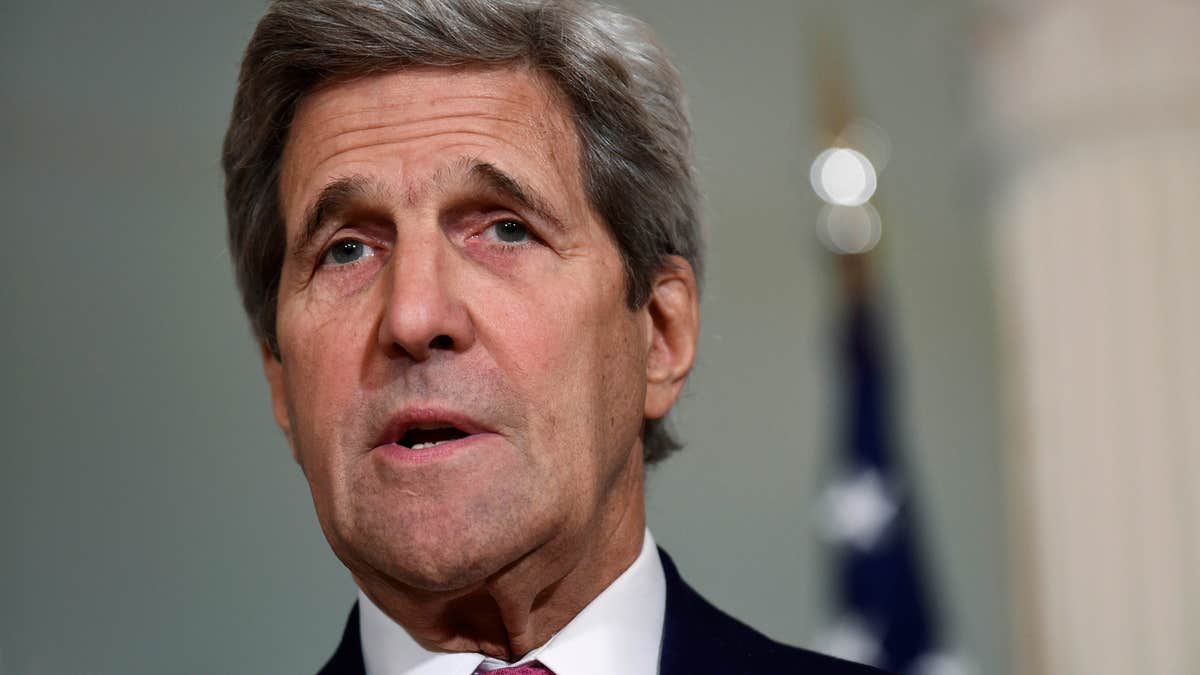
FILE - In this March 30, 2016, file photo, Secretary of State John Kerry speaks during a media availability at the State Department in Washington. (AP)
Secretary of State John Kerry urged Syrian government forces Saturday to stop bombarding the city of Aleppo as it moves in to retake it.
Kerry said the priority was “a durable, nationwide cessation.” The UN envoy for Syria and the lead opposition negotiator have urged the U.S. and Russia to step in and take control of peace talks as a fragile truce hangs in the balance.
The truce between Syrian President Bashar Assad and the U.S.-backed moderate rebels was called in February with the help of the U.S. and Russia.
This week, fierce bombing has ramped up with heavy civilian casualties, including the bombing of a Doctors Without Borders hospital that killed one of the last pediatricians left in the country. However, Russia has resisted calls to pressure Assad to stop his bombing campaign.
The International Committee of the Red Cross warned that the intensification of fighting threatens to cause a humanitarian disaster for millions of people. A statement issued late Friday said four medical facilities on both sides of the city were hit earlier that day, including a dialysis center and a cardiac hospital. ICRC appealed to all parties in the conflict "for an immediate halt in the attacks."
"There can be no justification for these appalling acts of violence deliberately targeting hospitals and clinics, which are strictly prohibited under international humanitarian law," said Marianne Gasser, head of the ICRC in Syria. "People keep dying in these attacks. There is no safe place anymore in Aleppo."
"For the sake of people in Aleppo, we call for all to stop this indiscriminate violence," Gasser said.
Kerry is planning to talk with UN envoy Staffan de Mistura in Geneva Sunday along with Saudi and Jordanian foreign ministers. Aleppo was left out of the original “cessation of hostilities” agreement that included the Latakia and Eastern Ghouta regions.
According to the AFP, Kerry has expressed “deep concern” about Aleppo to de Mistura and Riad Hijab – the chief negotiator for the High Negations Committee.
The secretary made clear that ending violence in Aleppo and returning ultimately to a durable, nationwide cessation is a top priority, State Department spokesman John Kirby said.
Kerry dismissed Russian claims that airstrikes are targeting the Nusra Front in Aleppo and instead claiming civilian lives.
“The Assad regime continues to escalate the conflict by predominantly targeting innocent civilians and parties to the cessation of hostilities – not Nusra, as the regime falsely claims,” Kirby said. “Such attacks are direct violations of the cessation and must stop immediately.
Aleppo has suffered some of the worst fighting in the Syrian conflict. Fighting in the civil war has clamed more than 270,000 people.
In neighboring Lebanon's capital, Beirut, more than 100 people marched in the city center to protest Syrian government attacks, mainly those on Aleppo, calling them "war crimes." Lebanon is split between supporters and opponents of the rebellion against Assad.
In Damascus, ICRC spokesman Pawel Krzysiek said that despite the difficult situation in Aleppo, which hinders humanitarian operations in the city, aid deliveries elsewhere continued. Humanitarian convoys entered separate areas besieged by rebels and government forces, he said.
The convoys, a joint operation between the ICRC, the United Nations and the Syrian Arab Red Crescent, began delivering aid to Madaya and Zabadani — two mountain resorts near Damascus that have been besieged by government forces.
Krzysiek added that 20 other trucks entered the northwestern villages of Foua and Kfarya, which are being besieged by insurgents.
The ICRC delivers food parcels and wheat flour, medicines, bed nets, crutches and anti-lice shampoo to all locations, he said.
The U.N. Office for the Coordination of Humanitarian Affairs said on its Twitter account Saturday that the aid delivery in the four areas will be large enough to serve 61,000 people.
The Associated Press contributed to this report.







































